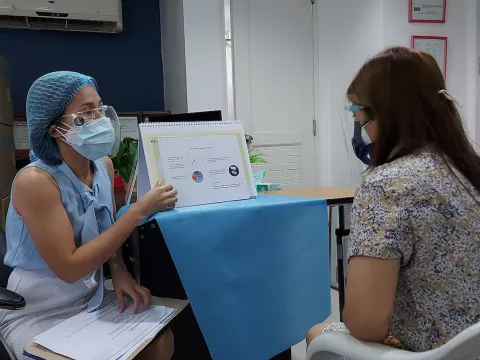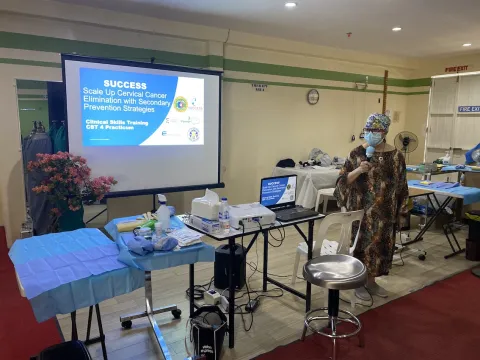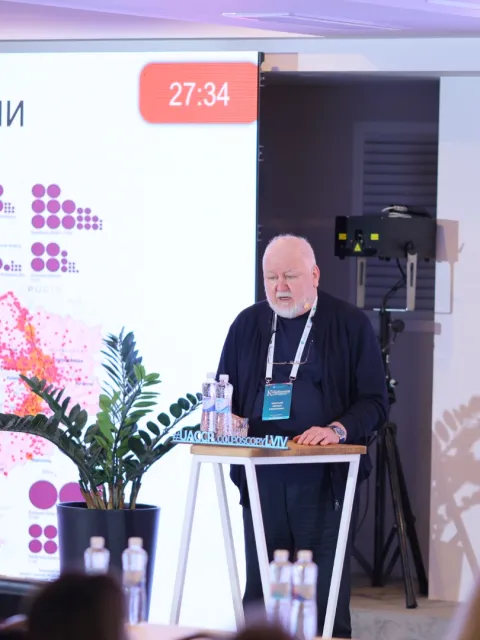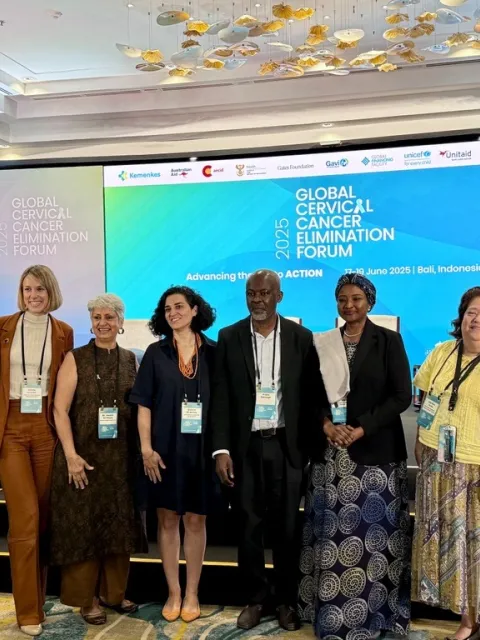Secondary cervical cancer prevention in the Philippines
The SUCCESS project builds upon a strong foundation of national commitment in the Philippines to facilitate the introduction of an accessible screening and early treatment model for cervical cancer.

This article showcasing secondary cervical cancer prevention in the Philippines is the last of four articles that UICC has published in a series dedicated to the countries supported by the SUCCESS (Scale-up Cervical Cancer Elimination with Secondary prevention Strategy) project. Burkina Faso, Côte d’Ivoire (Ivory Coast) and Guatemala, highlighted throughout November.
Secondary prevention refers to the screening and treatment of precancerous lesions, allowing for early detection of potential cancers and therefore more effective treatment.
SUCCESS, funded by Unitaid and led by Expertise France in collaboration with Jhpiego and UICC, aims to support Burkina Faso, Côte d’Ivoire, the Philippines and Guatemala in scaling up their actions to achieve the targets in set out in the WHO Global Strategy to eliminate cervical cancer, which was officially launched by WHO on 17 November 2020.
The '90-70-90' targets for 2030 include vaccinating 90% of girls by age 15 against human papillomavirus (HPV), which contributes to more than 70% of all cervical cancer cases; screening 70% of women by age 35 and again by age 45 with a high-performance test; and providing adequate treatment to at least 90% of those diagnosed with cervical cancer.
A comprehensive model for cervical cancer screening and treatment

The first woman was screened for HPV as part of the SUCCESS project using state-of-the-art DNA molecular assay testing on 7 November 2021 in San Pedro City, Laguna.
Over the following two-week start-up period for cervical cancer screening in three of the 30 SUCCESS project sites (Evangelista Medical Specialty Hospital, Jose R. Reyes Memorial Medical Center and Tondo Medical Center), a total of 98 women were screened by trained health service providers.
The Department of Health of the Philippines has issued policies supporting the SUCCESS Project as well as guidelines supporting the use of GeneXpert machines in tuberculosis diagnostics laboratories for HPV DNA screening.
While 4% of women were assisted by a health worker, 96% of sample collection was done through self-collection, which demonstrates that this method is well accepted by women in this context. Self-sampling is an effective and convenient alternative to the traditional pelvic examinations required for cervical cancer screening, and has the potential to help increase acceptance and access to cervical cancer screening amongst women.
Initial laboratory results show just over 13% test positivity for HPV. Women who have screened positive will receive follow-up diagnostic procedures and treatment of precancerous lesions in relevant facilities.
These services will be made available to the general population, even in remote areas, to ensure that it reaches all women. To this end, recording, reporting and supply chain management will be set up or strengthened.
The systematic screening service introduced by SUCCESS targets women aged 30-49 (25-49 for women living with HIV). New technologies are integrated at every level, including: self-collection, HPV-DNA testing, thermal ablation of precancers, navigation to treatment and tracking of individual screen-positive cases to confirm treatment outcomes.

A series of multisectoral workshops will take place in the next two months to support efforts to raise awareness of the services provided. These planning workshops will bring together relevant local health stakeholders (DOH regional offices, local health offices and chief executives) to help project sites establish cervical cancer prevention services within their respective catchment areas.
Engagement and action planning meetings with grassroots groups kicked off last November 29 at Brgy 123 in Tondo, Manila, to develop concrete approaches and strategies to train community-level health volunteers and peer health educators, whose work will involve encouraging other women to adopt healthy behaviours and get screened regularly.
Civil society: an active force in driving national policies and raising awareness
The Cancer Coalition Philippines (CCPh), in conjunction with other civil society actors, has played a fundamental role in the progress made in cancer control in the country over the years.
This national coalition of cancer patient organisations, health care providers and advocates, works with government authorities, policymakers, the private sector, and international development partners to help implement best practice models for safe, quality, accessible, affordable cancer care and achieve better outcomes for people with cancer.
The valued role of civil society in the Philippines is reflected in the appointment of a representative of the Coalition to the National Cancer Control Committee: Ms Carmen Auste, Senior Vice President of CCPh and CEO of the Cancer Warriors Foundation, a UICC member organisation. Working to ensure the implementation of the National Integrated Cancer Control Act, CCPh recently obtained an increase in national budget for cancer control, for which the Coalition had been advocating.
CCPh is also lending its influence in guiding national cancer policy to the cause of cervical cancer elimination and working with UICC as part of the SUCCESS project. In the past year, the Coalition has successfully advocated with the Ministry of Health to include cervical cancer medicines in the Cancer Palliative Care Medicine Access Program. These will be available in 26 sites and accredited hospitals throughout the Philippines. The national cancer control plan also includes key actions on raising awareness and providing screening and treatment for cervical cancer awareness.
"In the midst of COVID, the SUCCESS project is a ray of hope, signalling improved opportunities for increasing survivorship in cervical cancer. It is also a great model of international collaboration as well as an effective whole-of-society and whole-of-government strategy. Indeed, together , we are better and together, we can eliminate cervical cancer."
– Carmen Auste, VP Cancer Coalition Philippines, Member National Integrated Cancer Control Council
The Coalition was also successful at having people currently being treated for cancer as well as cancer survivors recognised as persons with disability (PWD). A PWD card entitles the holder to a 20% discount on medicines, laboratory and hospital expenses, restaurants and dining, essential food items bought at supermarkets, transport and accommodation.
A nationwide research study on the cost of disease that was previously designed only for breast cancer has now been expanded to include cervical cancer as well as five other leading cancers that contribute to 80% of the cancer burden in the Philippines. The initiative was a collaborative effort between the Cancer Coalition Philippines, the Philippine Cancer Society and the Philippine Society of Medical Oncology, with a research grant from Roche Philippines and technical guidance from the Non-Communicable Diseases team at WHO in Geneva.
Working closely with the Jhpiego and SUCCESS project team, the Coalition has contributed to the design of a national messaging programme for cervical cancer, with local Information, Education and Communication (IEC) materials to be made available in waiting areas at clinics of the 30 project sites.
Finally, the Foundation successfully engaged local government units in providing resources and mobilising support to finance cervical cancer services.
Last update
Tuesday 14 December 2021
